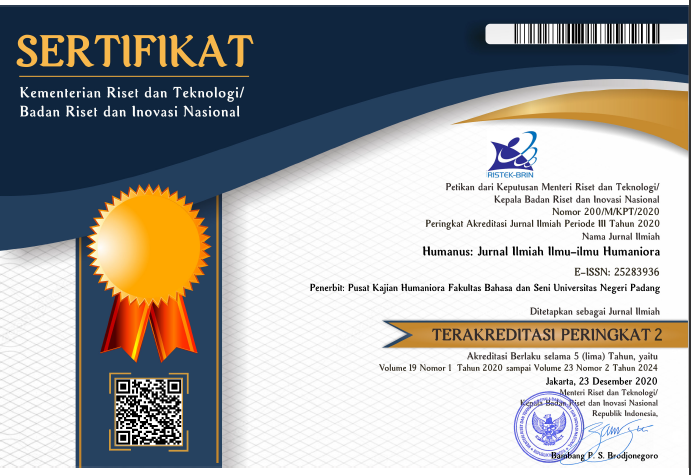POWER, ORIENTATION, AND STRATEGY OF POSITIVE POLITENESS USED BY CHILDREN AT THE AGE OF ELEMENTARY SCHOOL WITH JAVANESE CULTURAL BACKGROUND
 ), Abdul Ngalim(2), Anam Sutopo(3), Muhammad Rohmadi(4), Tommi Yuniawan(5),
), Abdul Ngalim(2), Anam Sutopo(3), Muhammad Rohmadi(4), Tommi Yuniawan(5), (1) Universitas Muhammadiyah Surakarta
(2) Universitas Muhammadiyah Surakarta
(3) Universitas Muhammadiyah Surakarta
(4) Universitas Sebelas Maret
(5) Universitas Negeri Semarang
 Corresponding Author
Corresponding Author
Copyright (c) 2018 Humanus
DOI : https://doi.org/10.24036/humanus.v17i2.101371
Full Text:
 Language : en
Language : en
Abstract
Politeness strategies in primary school is the foundation of character building. This study aims to identify the power and orientation of positive politeness strategies used by the children at the age of elementary school as the character of Indonesian. This study applies qualitative research with single-case study strategy. The data source consists of all elementary school teachers and students in Surakarta and Yogyakarta. The data were collected by using active observation and focus group discussion. The data are in the forms of teaching materials. The data were analyzed using heuristic model proposed by Grice & Leech by applying the principles of reconciliation, cultural and social harmony. The result shows that the elementary school teachers and students having the Javanese cultural background indicated by (a) building the nature of psychological as the core of positive politeness and nation character by improving the empathy feeling, looking for the agreement, giving respect, appreciating the achievement, and giving the profit to another; (b) prioritizing the duty instead of the rights; (c) creating the wise of directive act strategyby positioning the listener ; (d) respecting others to show the suavity and politeness. Therefore, the Javanese society in line with directive politeness action always put the environment society to keep its social-societal relationship.
Keywords: directive politeness, harmony principle, javanese cultural,positive politeness, socio-societal
Abstrak
Strategi kesantunan di sekolah dasar adalah fondasi pembentukan karakter. Penelitian ini bertujuan untuk mengidentifikasi kekuatan dan orientasi strategi kesantunan positif anak-anak di usia sekolah dasar sebagai karakter bangsa Indonesia. Penelitian ini merupakan penelitian kualitatif dengan jenis studi kasus tunggal. Sumber data terdiri dari semua guru sekolah dasar dan anak-anak usia SD di Surakarta dan Yogyakarta. Data dikumpulkan dengan menggunakan observasi aktif dan diskusi kelompok fokus. Data tersebut berupa bahan ajar. Data dianalisis menggunakan model heuristik yang diajukan oleh Grice & Leech dengan menerapkan prinsip rekonsiliasi, budaya dan keharmonisan sosial. Hasilnya menunjukkan bahwa guru sekolah dasar dan anak-anak usia SD yang memiliki latar belakang budaya Jawa ditunjukkan dengan (a) membangun sifat psikologis sebagai inti dari kesantunan positif dan karakter bangsa dengan meningkatkan perasaan empati, mencari kesepakatan, memberikan rasa hormat, menghargai pencapaian, dan memberikan keuntungan kepada yang lain; (b) memprioritaskan tugas dan bukan hak; (c) menciptakan strategi tindakan yang efektif dengan memposisikan pendengar; (D) menghormati orang lain untuk menunjukkan kesantunan. Oleh karena itu, masyarakat Jawa sejalan dengan tindakan kesopanan direktif selalu menempatkan masyarakat lingkungan untuk menjaga hubungan sosial-kemasyarakatannya.
Kata Kunci: kesantunan direktif, prinsip harmoni, budaya jawa, kesantunan positif, sosio-sosietal.
Keywords
References
Akinwotu, D. S. A. (2015). Vision for sustainable development: Pragmatic strategies of media political competitive encounter. International Journal Of Language And Literature, 3(2), 134–143. Https://Doi.Org/10.15640/Ijll.V3n2a14
Ardi, H., Nababan, M. R., Djatmika, & Santosa, R. (2018). Characters’ politeness strategies in giving command: Should translators keep them? 3l: Language, Linguistics, Literature, 24(2), 181–193. Https://doi.org/10.17576/3l-2018-2402-14
Beaver, D. (2007). Semantics and pragmatics — A New Journal. Semantics & Pragmatics, 01, 1–14.
Blum-Kulka, S. (1987). Indirectness and politeness in requests: same or different? Journal of Pragmatics, 11(2), 131–146. Https://doi.org/10.1016/0378-2166(87)90192-5
Brown, P. & Levinson, S. C. (1987). Politeness In some universal in language usage. Cambridge: Cambridge University Press.
Brown, P. (2015). Politeness and language. International Encyclopedia Of The Social & Behavioral Sciences: Second Edition (Second Edi, Vol. 18). Elsevier. Https://doi.org/10.1016/B978-0-08-097086-8.53072-4
De Leon, K. D., & Parina, J. C. M. (2016). A study of Filipino complaints in English and Tagalog. 3l: Language, Linguistics, Literature, 22(1), 191–206. https://doi.org/10.17576/3l-2016-2201-15
Grice, H.P. (1981). Presupposition and conversational implicature. New York: Academic Press.
Gunarwan, A. (1994). Kesantunan negatif di kalangan dwibahasawan Indonesia-Jawa di Jakarta: Kajian sosiopragmatik. Berkala Pellba 7. Jakarta: Pusat Kajian Bahasa Dan Budaya Unika Atmajaya.
Gunarwan, A. (2000). Tindak tutur melarang di kalangan dua kelompok etnis Indonesia: Ke arah kajian etnopragmatik. Berkala Pellba 13. Jakarta: Pusat Kajian Bahasa dan Budaya Unika Atmajaya.
Halliday, M.A.K. & Hasan, R. (1992). Language, context, and text: Aspect of language in social-semiotic perspective. Victoria: Deakin University.
Lam, C. (2011). Linguistic politeness in student-team emails: Its impact on trust between leaders and members. IEEE Transactions On Professional Communication. Https://Doi.Org/10.1109/Tpc.2011.2172669
Leech, G. N. (1983). Principles Of Pragmatics. London: Longman.
Lestari, P., & Prayitno, J. (2016). Strategi dan skala kesantunan tindak direktif mahasiswa Riau di lingkungan masyarakat berlatar belakang budaya Jawa. Jurnal Penelitian Humaniora, 17, 135–148. Retrieved From Http://Journals.Ums.Ac.Id/Index.Php/Humaniora/Article/Download/2533/1704
Muslich, M. (2006). Kesantunan berbahasa. Journal of Humanities and Social Sciences, Prince of Songkhla University, Pattani, Thailand.
Maros, M., & Rosli, L. (2017). Politeness strategies in Twitter updates of female English language studies Malaysian undergraduates. 3l: Language, Linguistics, Literature, 23(1), 132–149. https://doi.org/10.17576/3l-2017-2301-10
Mustadi, A., Suhardi, Susilaningrum, E. S., Ummah, R., Purwatiningtyas, M., & Wijayanti, P. E. (2017). Character-based reflective picture storybook: Improving student’s social self-concept in elementary school. Cakrawala Pendidikan, xxxvi(3), 369–381.
Prayitno, H. J. (2009). Perilaku tindak tutur berbahasa pemimpin dalam wacana rapat dinas: Kajian pragmatik dengan pendekatan jender. Kajian Linguistik dan Sastra, 21(2),.
Prayitno, H. J. (2010). Perwujudan prinsip kerja sama, sopan santun, dan ironi para pejabat dalam peristiwa rapat dinas di lingkungan pemerintahan kota berbudaya Jawa. Kajian Linguistik dan Sastra, 21(2).
Prayitno, H. J. (2011). Teknik dan strategi kesantunan direktif di kalangan andik SD berlatar belakang budaya Jawa. Kajian Linguistik Dan Sastra, 22(2).
Prayitno, H. J., Ngalim, A., Rohmadi, M., & Riyanto, U. (2018). Strategies of refusal speech act by Javanese culture-based students at Darul Ihsan Muhammadiyah Islamic boarding school Sragen Indonesia. Edulearn Journal, 12(3), 520–528. https://doi.org/10.11591/Edulearn.V12i3.9300
Rinaldi, R. (2017). Rhetoric dan figure of speech Minangkabau locality in tonil script Sabai Nan Aluih by Sutan Sati. Humanus, 16(2), 117. https://doi.org/10.24036/humanus.v16i2.7627
Saddhono, K., Wardani, N. E., & Ulya, C. (2015). Sociopragmatic approach on discourse structure of Friday prayer’s sermon in Java dnd Madura Island. Journal of Language Literature, 6(1), 2078–2303. https://doi.org/10.7813/Jll.2015/6-1/6
Febriadina, Z. F., Sumarwati, S., & Sumarlam, S. (2018). Male and female students ’ politeness in Sragen , Central Java. Humanus, (1993), 73–83. https://doi.org/10.24036/humanus.V17i1.8429
Suastra, I. W., Jatmiko, B., Ristiati, N. P., & Yasmini, L. P. B. (2017). Developing characters based on local wisdom of Bali in teaching physics in senior high school. Jurnal Pendidikan Ipa Indonesia. https://doi.org/10.15294/jpii.v6i2.10681
Subroto, Edi. (2008). Bagaimana Kesantunan Berbahasa Di Kalangan Anak Muda. Retrieved From: Www.Kr.Co.Id/Web/Detail.Php?Sid=184199&Actmenu=40, Accessed On 28 April 2009.
Sukarno, S. (2015). Politeness strategies in responding to compliments in Javanese. Indonesian Journal of Applied Linguistics, 4(2), 91. https://doi.org/10.17509/Ijal.V4i2.686
Tan, K. H., & Farashaiyan, A. (2012). The effectiveness of teaching formulaic politeness strategies in making request to undergraduates in an ESL classroom. Asian Social Science. https://doi.org/10.5539/ass.v8n15p189
Van Der Bom, I., & Grainger, K. (2015). Journal Of Politeness Research: Introduction. Journal Of Politeness Research, 11(2), 165–178. https://doi.org/10.1515/Pr-2015-0007
Farisi, Z. A. (2015). Speech act of iltifat and its Indonesian translation problems. Indonesian Journal of Applied Linguistics, 4(2), 78. Https://doi.org/10.17509/Ijal.V4i2.685
 Article Metrics
Article Metrics
 Abstract Views : 770 times
Abstract Views : 770 times
 PDF Downloaded : 272 times
PDF Downloaded : 272 times
Refbacks
- There are currently no refbacks.
Copyright (c) 2018 Humanus

This work is licensed under a Creative Commons Attribution-NonCommercial 4.0 International License.









